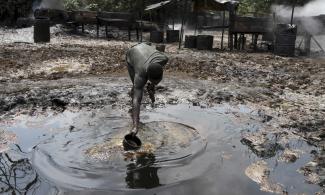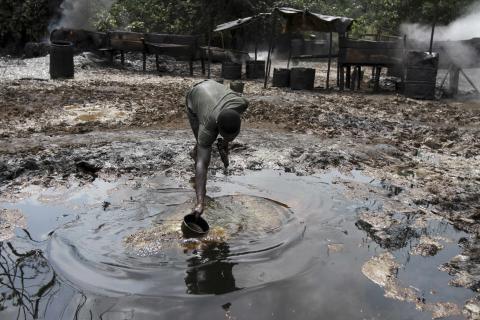
It is scary how Nigeria is overlooking the issue of climate change even when it affects the poorest of Nigerians. The government is funding a global slide into permanently changed weather systems through it subsidies.

Nigeria's delayed transition to cleaner sources of energy with the potential to slow down the effects of climate change is fuelled by state sponsored petroleum subsidies, which make products from fossil fuel cheaper and available to Nigerians for use.
According to Nigeria's Petroleum Products Pricing Regulatory Agency, the country is expected to spend N750.81bn on petrol subsidy in 2020. The figure is N300.81bn higher than the N450bn approved by Nigeria's finance ministry in 2019 for subsidies.
The resolve of the government to make fossil fuel easier to afford has raised a question of sustainability among environmental activists in Nigeria.
"It is scary how Nigeria is overlooking the issue of climate change even when it affects the poorest of Nigerians. The government is funding a global slide into permanently changed weather systems through it subsidies.
"These climatic changes affect when Nigeria's rural population go to farm and the yield they ultimately have.
“My advice has always been that funds from subsidies be moved to creating cleaner alternatives or diverted into sectors such as health and infrastructure," says Sakani George, an activist working to educate rural communities in Benue State on climate change.
Missed opportunity
In January 2012, Nigeria missed its opportunity to wean citizens off the high created by what some described as their only dividend from government in a country lacking in infrastructure and heavily reliant on the proceeds of sales from fossil fuel.
Goodluck Jonathan, Nigeria's President at the time, had removed subsidies, sparking nationwide protests. In response, the government provided 1600 diesel-powered mass transit vehicles as palliatives for commutes who would be affected by a price hike.
The decision did not augur well with Ladi Jacob, a rights activist.
She said, "For me, the government at that time missed a crucial chance to say no more and stand on its removal of the subsidies.
“Can you imagine removing subsidies and then providing cars which will pollute the environment with harmful toxins, this is because we are not in tune with global realities.
"The key is education. Educate the people on what is going on, create alternatives and encourage people to adapt is then remove the subsidies."
While the country still funds subsidies, its rural population is struggling to cope with impact of state-funded climate change. Tales of failed harvests and drought are becoming regular.
Yingi Bala, a farmer in Nigeria's North-Eastern town of Yobe said he slid further into poverty this year due to changing weather systems.
"In March, there was rain and we ran to start farming. We didn't see any rain again until early July and even then it was sparse. All my crops failed, I have nothing to feed my nine children."
When queried on his knowledge of climate change and the link subsidies have in contributing to what he experienced, he simply said, "I don't know any of those things."
Nigeria's unsustainable subsidies on fossil fuel products not only eases citizens’ decline into poverty, it also contributes massively to emission of greenhouse gasses. If Nigeria must join the conversation of the future, it must end its subsidies.
This article was written with the support of Climatetracker.org as part of the 2019 Climate Tracker Data Journalism Fellowship